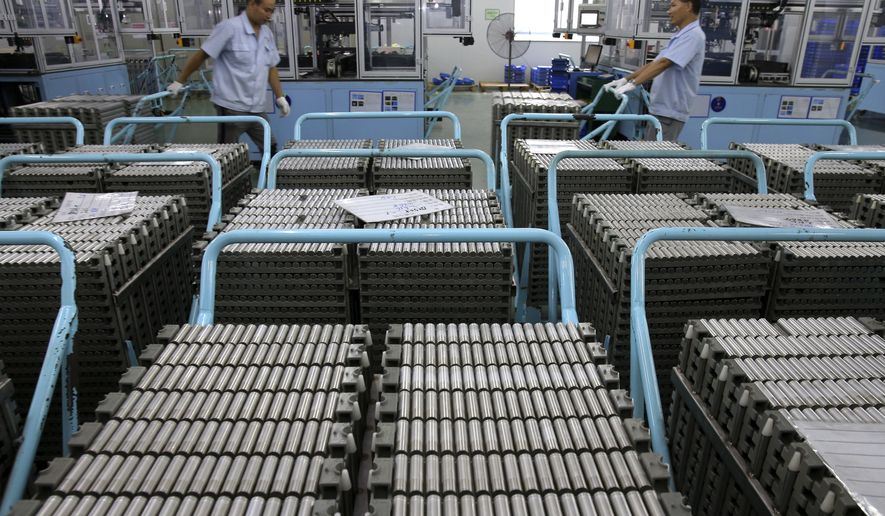China said Wednesday it will impose a 25-percent tax on hundreds of U.S. products, the latest retaliation in a trade war that’s raising anxiety among American farmers and other businesses about their prospects for the rest of the year.
The Chinese Ministry of Commerce announced the charge on $16 billion worth of U.S. goods, including large passenger cars, motorcycles, fiber-optical cables, plastic products, coal and asphalt. The tariffs will go into effect Aug. 23.
Chinese state media accused the U.S of a “mobster mentality” in its move to implement additional tariffs, and warned that Beijing had all the necessary means to fight back.
The move came after the U.S. Trade Representative released a final list of $16 billion worth in Chinese goods that will be hit with tariffs, also to take effect Aug. 23. The latest U.S. list brings the total worth of Chinese products facing a 25-percent tariff to $50 billion.
President Trump’s escalating trade war with China is causing heightened concern among several sectors of the U.S. economy, particularly agriculture.
The Purdue University/CME Group said this week that their “Ag Economy Barometer” declined 26 points in July, the largest one-month decline in producer sentiment since data collection began in October 2015. The drop was fueled by increasing trade war concerns as well as decreasing commodity prices.
“This summer we’ve seen tariffs placed on imports of U.S. ag products by China and Mexico that are impacting producers’ bottom line,” said James Mintert, director of Purdue’s Center for Commercial Agriculture. “Over two-thirds of respondents indicated they expect to see lower income because of trade conflicts, with over 70 percent of them expecting a net income decline of 10 percent or more.”
The Consumer Technology Association said the administration’s latest list of products subject to a 25-percent tariff will “raise prices for manufacturers, force consumers to pay more and throttle our economic growth.”
“The new tariff list — covering major technology categories such as semiconductors and the equipment that makes them — includes 58 products our member companies say are critical to their businesses and will cost American jobs if taxed,” CTA President Gary Shapiro said. “These taxes are especially dangerous for small- and medium-sized companies.”
Mr. Trump, who hosted more than a dozen corporate leaders for dinner Tuesday night at his golf club in Bedminster, New Jersey, said the U.S. economic boom is being aided by his “powerful trade policies.”
“We’re in a little bit of a fight with China right now, and we’ve gone up,” he said of the tariffs.
In an apparent reference to the Chinese stock market, Mr. Trump said, “They’re down 28 percent since we [imposed tariffs] the last three or four months.”
He predicted, “We’ll ultimately have a fantastic trading relationship.”
At the dinner, Mr. Trump also bantered with White House economic adviser Larry Kudlow, who opposed tariffs before joining Mr. Trump’s team.
“We don’t always agree on things, but we’re learning to agree on things — meaning you’re coming along, Larry,” the president said to laughter.
Daniel Ikenson, director of the Cato’s Institute’s Center for Trade Policy Studies, said Mr. Trump’s demands are unclear.
“Exactly what does the administration expect Beijing to do in exchange for dropping the tariffs?” Mr. Ikenson said. “With his recent overture to the EU and his authorization of $12 billion in subsidies to U.S. farmers, Trump seems to be digging in for a trade war of attrition. With very little substantive dialogue under way between the governments, matters are likely to get much worse before they get better.”
Last month, after announcing an agreement for the European Union to buy U.S. soybeans, Mr. Trump told an audience in Iowa, that he had secured one of the “biggest of all” trade deals.
“We just opened up Europe for you farmers,” the president said. “You’re not going to be too angry with Trump. You have just gotten yourself one big market.”
Next month, the administration will start a $12 billion emergency bailout for farmers, an expense that doesn’t require congressional approval. Some farmers will receive direct payments; the money also will pay for an existing program to buy surplus farm products and deliver them to food banks.
• This article is based in part on wire reports.
• Dave Boyer can be reached at dboyer@washingtontimes.com.
• Gabriella Muñoz can be reached at gmunoz@washingtontimes.com.




Please read our comment policy before commenting.